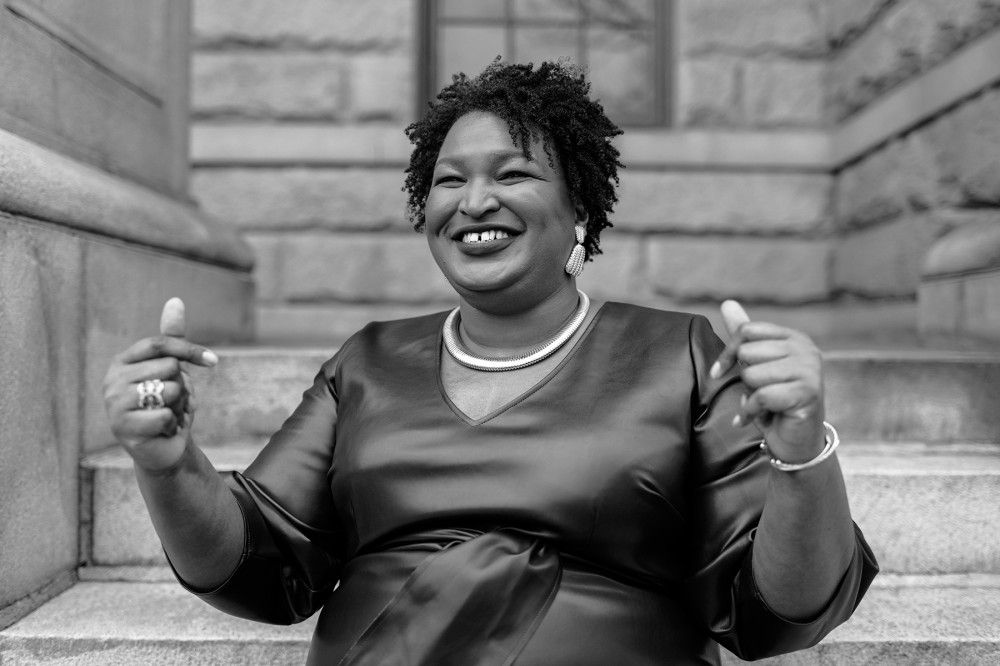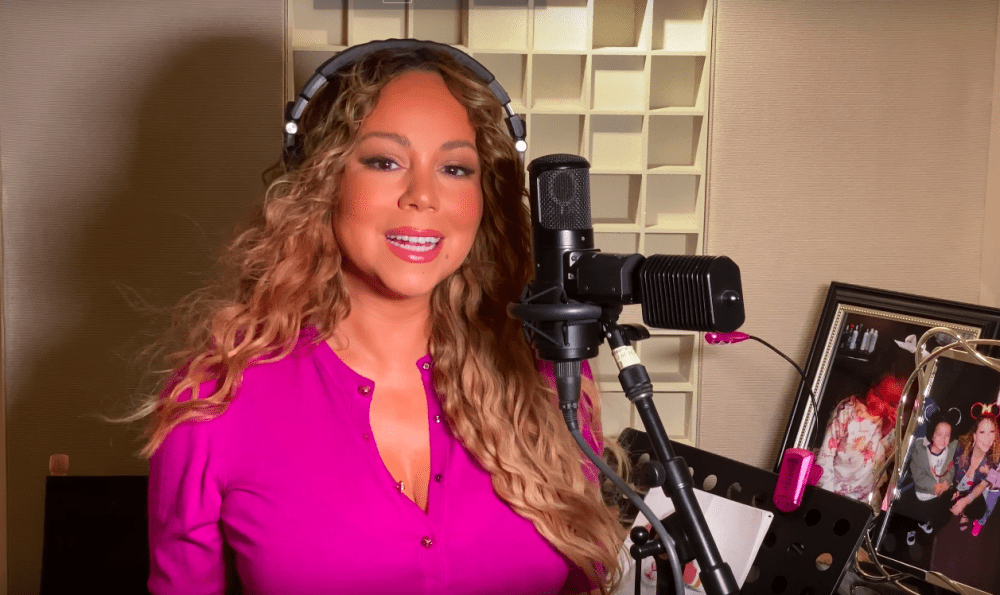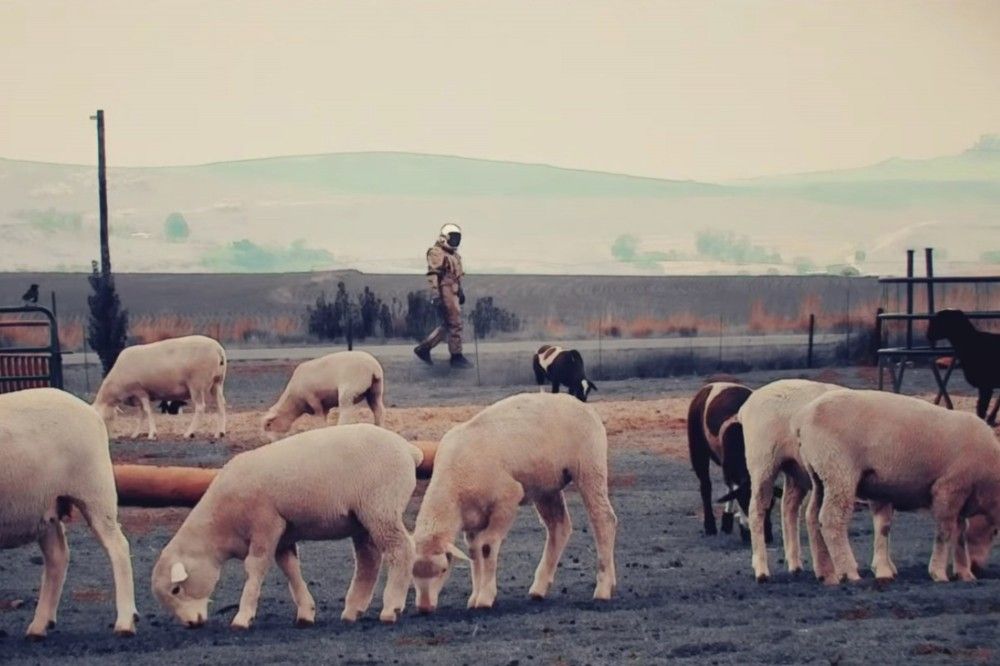
Stacey Abrams Is Building a New Kind of Political Machine in the Deep South
slips out of a chauffeured black Escalade and through the hotel caterers’ entrance. She snakes down the hallway to the step-and-repeat, where she snaps a few quick photos with Democratic Party officials, sweeps past the cash bar, slowing to shake hands with Congressman Hank Johnson, then ducks through the ballroom’s side door to take her place at Table One.
This is her third year headlining the Gwinnett County Democrats’ annual gala. Fifteen years ago, Gwinnett was a mostly rural, majority-white Republican stronghold. Today, it’s Atlanta’s largest suburb, the state’s most racially diverse county, and the epicenter of Georgia’s transformation into a battleground state.
Abrams, in a midnight-blue tuxedo jacket and sparkling teardrop earrings, is the center of gravity inside the neon-blue-lit ballroom. Party leaders, donors, and newly declared candidates revolve past the table to say hello, introduce their children, take selfies. She greets each warmly, bouncing babies on her knee, nodding appreciatively every few minutes when someone mentions her name from the stage. You’d never know that she hates this part of the job.
“ ‘Hatred’ is a strong word,” Abrams says. “I deeply dislike it, and would prefer not to do it.”
“She’s very good at it though,” Abrams’ right-hand woman, Chelsey Hall, mutters under her breath.
That morning, inside a different hotel ballroom, in a different Atlanta suburb — a room you needed to sign a non-disclosure agreement to get into — Abrams was doing the part of her job she actually enjoys: putting together a plan to combat the arsenal of new voting restrictions and suppression tactics she expects will be deployed in polling places around the country this November.
It was day two of a summit hosted by Fair Fight, one of the organizations Abrams formed after her narrow defeat in the 2018 Georgia governor’s race — an election plagued by voter-roll purges, poll-site closings, and a thousand other problems ranging from the grossly incompetent (voting machines missing their power cords) to the truly sinister (tens of thousands of mostly black voter registrations placed on hold).
In 2018, largely thanks to Abrams, Georgia’s Democratic Party had a full-time voter protection director; there was a hotline to report problems, volunteers to chase down provisional ballots, lawyers ready to go to court to keep polls open. It wasn’t enough, it turned out, against Abrams’ opponent, Georgia’s then-secretary of state, Brian Kemp, who was in charge of overseeing his own election — but it nearly was.
Now, with $21 million raised in 2019 alone, Fair Fight is training similar teams in 18 states. “I don’t have the capacity to sit still and wait for the next term, the next opportunity for me to stand for an office that let’s me do the work,” Abrams says.
Dozens of Democratic heavies descended on the summit that morning, including Michael Bloomberg, who has donated $5 million to Fair Fight. “Voter suppression efforts are happening across the country,” Bloomberg tells Rolling Stone, “and there is no one better to lead the counterattack than Stacey.”
The billionaire former mayor of New York is the latest in a string of high-profile presidential candidates to seek a sit-down with Abrams in the past year. “Those meetings went unremarked upon until I met with the former] vice president,” Abrams sighs. “And then there was a rumor started.”
She’s being diplomatic: Before Joe Biden got in the race, advisers to his campaign publicly floated the idea that he and Abrams might announce a joint ticket even before primary voting began. Abrams swatted down that report. (At the time, she was still considering her own run for president.) Biden isn’t the only one who has seemed interested: Bernie Sanders praised her abilities; Elizabeth Warren — who campaigned for Abrams in 2018 — said she’s open to naming a female VP; Pete Buttigieg met with Abrams privately and phone-banked for Fair Fight Action, stoking speculation he might tap her as a potential running mate.
And why not? Abrams is a young, charismatic Democrat from a potentially flippable state, a prodigious fundraiser, a captivating speaker. She is also black, like a large portion of the Democratic base (and unlike any of the leading candidates), with a record of motivating voters of all races. Latino and Asian-Pacific Islander turnout tripled when she ran for governor, and she got the highest level of support from white voters of any Democrat in Georgia since Bill Clinton.
She has an overachiever’s résumé — a graduate of Yale Law, a college professor, co-founder of a financial-services firm, bestselling author — but the personality of someone you’d actually want to hang out with. She’ll rap with you about her favorite Star Trek episodes, or country music (Dolly Parton and Earl Thomas Conley are favorites), or provide a detailed explanation of why the platypus is her favorite animal (“It is such an odd creature, makes no sense — it’s both mammalian and reptilian”).
Her team of aides address her as “Leader” — a holdover from her days as minority leader in the Statehouse but one that sounds quasi-cultish because of staffers’ obvious affection for her. She inspires a similar reaction in strangers: After the 2018 election, Abrams took her first vacation in years, to Turks and Caicos. “I had to stay inside because there were a lot of people that kept trying to hug me,” she says.
She even won over Republicans she worked with during her time in the Statehouse. In 2011, one GOP appointee predicted Abrams would be president someday: “Once she puts her mind to something, there is really nothing she can’t do.” Abrams herself has come around to that idea, answering, when she was asked recently if she saw herself in the White House within the next 20 years: “I do.”
So, of course potential Democratic nominees want her. The question is, What does Stacey Abrams want? If she was interested in a fancy title and stuffy office in Washington, D.C., she could have succumbed to the immense pressure to run for one of her state’s two open Senate seats. But she didn’t. That’s because Abrams has a very specific idea of what she is after, and here in Georgia, she’s already building it.
Twenty-eight years ago, Abrams was 18, heartbroken, and sitting in the Spelman College computer lab. She’d just been dumped by her boyfriend, and if her life felt like a bit of a mess, at least she could find relief in the neat rows of a Lotus 1-2-3 workbook. In one column of a spreadsheet she entered a list of goals (publish a bestselling novel, become a millionaire running her own business, be elected mayor of Atlanta). In another, the age by which she intended to have accomplished said goal (24, 30, 35, respectively).
None of it happened on schedule. She’s the author of eight romance novels written under the pen name Selena Montgomery — inspired by Elizabeth Montgomery, the actress who played Samantha and her evil twin, Serena, on Bewitched — but the first wasn’t published until she was 28. She took a pen name not because she worried that being a romance novelist would hurt a future political career, but because she worried her novels wouldn’t sell if readers knew she was a nerd. “If you Googled my name, the first thing that came up was that I’d written an article at the age of 17 on Mesopotamian astronomy. Both I and my publisher were concerned that people would not want to buy a romance] book written by, well, not Neil deGrasse Tyson, but basically by Stephen Hawking.”
With only a few minor adjustments, Abrams has had a pretty firm sense of what she’s wanted since that night in the computer lab. “I don’t like just the idea of doing stuff,” Abrams says. “I think you need to create a structure for it.” She still updates the spreadsheet (now an Excel file), adding new goals or revising old ones. She swapped out mayor for governor after a stint as deputy city attorney. “The mayor can do extraordinary things, but she will always be thwarted by a state government that, especially in the South, strips you of your power,” Abrams explains.
She was elected in 2006, but it took years of toiling before she was in a position to pursue the governorship. In the meantime, she was laying the groundwork, starting an organization — the New Georgia Project — that would register the tens of thousands of voters she knew she would need to have a chance at winning.
It still wasn’t enough. Kemp had purged more than 1.4 million voters from the rolls in Georgia between 2012 and 2018. He’d ordered the arrest of black organizers for registering voters ahead of a school-board election, and put the registrations of some 53,000 new voters — 70 percent of them black — “on hold.”
On the night of the election, “the incoming fire hose of problems — it was worse than I would have imagined,” says Lauren Groh-Wargo, Abrams’ former campaign manager and a co-founder of Fair Fight. “I had all these scenarios sketched out, and we were in Scenario Z, basically the clusterfuck scenario: that we don’t have enough information to know what’s even happening because there were such big voting problems.”
Abrams lost by 54,723 votes. She has resigned herself to the fact that she will probably never have full understanding of all the factors that conspired to arrive at that particular figure. “One of the ways suppression is so effective is that you never see all of it,” she says quietly.

Abrams with Obama in 2018. Photo credit: Melina Mara/The Washington Post/Getty Images
Ten days after the election, she delivered a speech ending her bid; her youngest sister, Jeanine Abrams McLean, stood behind her, ashen. “I wish I didn’t look so pissed in the photo,” Abrams McLean says. “I thought my face looked neutral, but every time I see it, I’m like, You motherf—.” Jeanine still gets choked up thinking of how much, in that moment, Stacey reminded her of their mother.
As teens, both Abrams’ parents were active in the civil-rights movement in Hattiesburg, Mississippi. When he was a teenager, Abrams’ dad, Robert, was arrested for helping register black voters. “My mom, across town, was doing the same work — she was just smart enough not to get caught,” Abrams jokes.
Her parents, who both became pastors, brought their six children with them to vote in every election and raised them to value public service: Abrams’ sisters are a federal judge, a college professor, and a Ph.D. working in public health; one of her brothers is a social worker, the other worked on hurricane recovery efforts in Mississippi.
“My mom and my father shared the same belief systems,” she says. And both, like Abrams, are storytellers: “When my dad does a sermon, there’s usually a really compelling story, an anecdote to get you drawn in. But you’re also confused half the time, like, ‘Where is he going with this?’ And it all makes sense in the end. My mom builds layers of understanding. She’s very deft with anecdotes, but her structure is much more about ‘I want you to leave here not just remembering the part that made you think, I want you to have to think about the part you didn’t get.’ ”
When Abrams was little, visiting her grandmother, with her some 16 first cousins running around, she was the one in the corner, holed up with a book. She loved Helen Keller’s The Story of My Life, The Count of Monte Cristo, Silas Marner, Little Women, Jane Eyre, Ender’s Game, Toni Morrison’s Beloved, Atlas Shrugged (“But not for the Paul Ryan reasons. . . . There was something about how Ayn Rand] highlighted the capacity of a person to be more than.”) She loved mythology. “Greek, Norse, Roman, Cherokee. If I could reach it, I would read it,” Abrams says.
Her mother, Carolyn, had dropped out of the fourth grade in part because her family couldn’t afford bus fare. The way Abrams tells the story, she found her way back thanks to the kindness of others — a neighbor who offered odd jobs to help her save a little money, a teacher who tucked a note in her file vouching for her — but it’s really a story about poverty and the structural barriers of escaping it.
“I came from a family that struggled financially. We had lots of education, but we are congenitally disposed toward poverty because my parents got master’s degrees and then went back to Mississippi to become poor ministers,” she joked onstage at the Gwinnett gala. “My sister became a judge after leaving one of the wealthiest law firms in America because we just don’t know how to do this right.”
She plays it for laughs, but Abrams’ larger point is about how difficult it’s been for her and her family — people who have done almost everything right — to stay on firm financial footing. And if there was one line of attack that seemed to stick to Abrams during the 2018 election, it was around the fact that she was $227,000 in debt. (Republican ads called her “fiscally irresponsible.”) Abrams started accruing the debt — a mix of credit cards, student loans, and deferred taxes — in college, and continued to rack it up supporting her brother, who struggled with a drug addiction, and helping her parents, who are raising her brother’s daughter.
But the narrative that she is bad with money runs contrary to the rest of Abrams’ biography, being a successful tax attorney, co-founding a thriving financial-services firm, and as city attorney going toe-to-toe with then-NBA commissioner David Stern during negotiations over the WNBA’s Dream moving to Atlanta. (“He screamed at me. It’s my claim to fame. Made me really popular with my brothers.”)
Coincidentally, Abrams’ role with the Dream meant she was, briefly, the lawyer for Georgia’s newest U.S. senator, Kelly Loeffler, a bitcoin market executive who Gov. Kemp appointed in December. Abrams negotiated the team’s deal with the NBA when Loeffler and her partner purchased it in 2011. But that doesn’t make them allies. “I deeply disagree with the policy positions she has espoused and the approach she is taking, and I do not support her,” Abrams says. “I’m going to be very actively involved in ensuring that a Democrat wins that seat.”
Abrams ended up settling her outstanding debt this past May with the money she made from her bestselling 2018 memoir, Lead From the Outside. She’s now in the final stages of writing her next book, Our Time Is Now, on voter suppression, scheduled to hit bookstores in June. When we sat down to talk in January, she’d just received word she’d sold yet another book, the details of which she wasn’t ready to publicly disclose. One of her earlier romance novels is being developed into a television show at CBS, and she’s working with the Emmy- and Oscar-nominated director Liz Garbus on a documentary about the history of voter suppression.
“I’m a good loser,” Abrams concedes, reflecting on the 14 months since her loss to Kemp. But even with everything she has going on, there’s always space for new ideas, bigger ambitions, and more cells on the spreadsheet.
Abrams’ voice carries across the hotel ballroom in a way, one imagines, she must have learned from her parents. She is retelling a story her grandmother told her, about a time shortly after the Voting Rights Act passed, when Abrams’ grandfather was struggling to coax her grandmother to the polls: “I remember the last time we tried,” she told him. “The billy clubs and the dogs, and they spray you with those hoses.”
It was the shame she felt over her own fear that forced Abrams’ grandmother to the voting booth that day. She never missed another election. “Across Gwinnett, across Georgia, there are folks who are afraid of their power, who are afraid of what they remember, and they’re afraid to try this time,” Abrams is saying. “In 2020, our responsibility is to erase their fear, to take their hands and walk with them. . . . Yes, they have been silenced . . . but this time they are not going alone.”
It brings the house down.
This crowd has good reason to take Abrams at her word. They are already beneficiaries of the work she’s done here. When she was elected minority leader back in 2010, the Georgia Democratic Party was in a beleaguered state. It had lost every statewide office — Republicans held a supermajority in the state Senate and were only a few seats short of one in the house.
“There were two employees. They were barely keeping the lights on. It was a wreck,” Rebecca DeHart, who Abrams tapped to help rebuild the party, recalls. “Stacey — always thinking long-term — knew she wanted a strong party structure in Georgia.” By the time Abrams ran for governor in 2018, the party had 150 employees and $25 million in the bank. “We built it to where we wanted it to be,” DeHart says. That year, they flipped 16 seats.
Now, Abrams is creating a new kind of political machine, poised to reshape the Georgia electorate from the ground up. It began in the days after the 2018 election, when she was sick and depressed sitting on the couch in her Kirkwood townhouse, bingeing episodes of Doctor Who.
“I had a notepad, and I’m sitting in the corner of my couch, and Jeanine would come by every day to make sure I’m not committing ritual suicide,” Abrams jokes. “I had drawn this chart, and it had three circles. It said, ‘Voting,’ ‘Census,’ ‘Policy.’
“These are the things that I just don’t trust Kemp] to do,” she told her sister. “If I believe in what I’ve been saying, my job is to make sure it gets done anyway, even if I’m not able to use the platform of a governorship to do it.”
The circles are now four stand-alone organizations, each run by a different trusted female deputy: Fair Fight, the political arm; Fair Fight Action; Fair Count; and the Southern Economic Advancement Project, a think tank intended to, in Abrams’ words, “translate good policy into Southern.”
Of the organizations, Fair Fight Action — which is spearheading a lawsuit accusing Kemp of systematically disenfranchising lower-income and minority voters — is the best known. But the organization that has the potential to make the biggest immediate impact on Georgia is Fair Count, the nonprofit Abrams conceived to combat the undercount of minority communities in the 2020 census, which will decide how more than $1.5 trillion in federal resources are allocated and how congressional districts are drawn. The predicted undercount of black men alone in Georgia is expected to cost the state $154 million annually — enough to pay for Medicaid expansion in the state.
“The undercount in Georgia in 2010] had a visceral effect on the work I was able to do as a legislator,” Abrams says. “I knew communities were simply erased from the narrative.”
Abrams asked her sister Jeanine — who was working with epidemiologists at the Centers for Disease Control and Prevention, studying the spread of gonorrhea — how she would go about trying to ensure every person in Georgia was counted. “Her job was to literally find people who did not want to be found,” Abrams recalls. “I said, ‘How would you do that?’ ”
Jeanine quit her job and joined Fair Count. From a small clapboard house in Atlanta’s Grant Park neighborhood, she, DeHart, and a team of 23 employees are figuring out how to reach every person in Georgia. Because 2020 is the first time the census will accept responses online, they’re giving away iPads and Chromebooks and installing internet routers in places like churches, barbershops, soup kitchens, day cares, and community centers.
“There’s really no other organization like Fair Count in the nation,” DeHart says. “It’s not surprising — it was born out of Stacey’s brain.”
Abrams hops up into the Escalade and exhales. It’s late, she is exhausted, and she still has a long drive home from Gwinnett. She got a call from her mom earlier that day. Carolyn said she heard the Fair Fight summit had gone well — a friend of a friend told her the strategy session set her “on fire.” Abrams smiles at that thought. “To believe in possibility in Mississippi when it comes to voter protection? If we can pull that off, then it was really effective.”
Abrams may not have enjoyed all the glad-handing she had to do at the fundraiser, but at least she can feel satisfied knowing she’d done her part. She jokes that her father used to get in trouble for telling his congregants that they were “going to hell because they weren’t doing enough good work.” You get the sense that this idea — that she’s not doing enough — haunts Abrams.
“Most people who go into politics, they want to be in politics. They enjoy the rigor of the campaign as much as they do the policy,” she says. “For me, policy is the reason we do this. It’s how do you make people’s lives better?”
That’s what Stacey Abrams wants. And if there is a political office from which she can do it, that’s great. And if there isn’t, she’ll find another way. “The goal I can plan for is, most likely, governor. There are other opportunities,” Abrams says obliquely. “But I have no control over how that happens.”
She doesn’t shrink from questions about the vice presidency, though. “I think it’s not only disingenuous, but it is inappropriate as a woman of color, when presented with that as an option, to dismiss it out of hand,” Abrams tells me. “Because the idiom ‘You can’t be what you cannot see’ is true. How do you get things if people don’t know you want them? For me, it’s not that I want that for itself, but if people ask me if that’s a job I would take? Absolutely.”
The most obvious clue that she’s keen on the prospect surfaces when I ask her what she wishes more people knew about her. Her answer: that she has a lot of foreign-policy experience. (An aide later emails, unprompted, a 13-point list of Abrams’ foreign-policy experience, including seven international fellowships.)
“I believe that there is value to serving as the chief lieutenant to someone who has to remake the world that’s been broken by our current administration,” Abrams says.
Her interest, as always, is contingent on the work she would be able to do there. “If you look at H.R.1 and H.R.4” — legislation to expand voting rights and limit gerrymandering that’s languishing while Republicans have control of the Senate — “there are blueprints that have already gone through Congress. One of the jobs I would love to have is making sure that those laws actually become real,” she says.
But what she wants more than anything — more than the governorship or the vice presidency or for the organizations she’s created to thrive, is for those organizations to cease to exist.
“I would love for the work we do to be rendered obsolete by the permanence of protection for those who need it,” she says. “The permanence of policies that serve to benefit the communities that are most vulnerable. I mean, that’s the goal. The goal is obsolescence. If we have good leadership, if people actually get to vote, if those who are marginalized actually wield their power effectively and elect leaders who see them, then you don’t need organizations to remind them and to teach them how that power can be used.”



